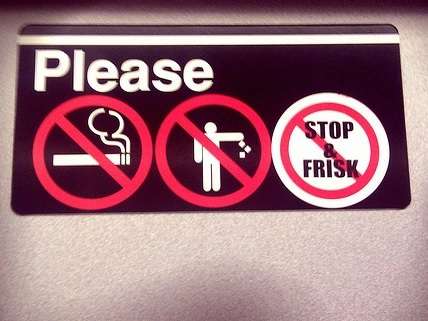Stop-and-Frisk in Court, Police Testify About Orders to Increase Stops, Democrats Jockey Ahead of Election
Stop it

The NYPD's stop and frisk program began in 2002 and since then, according to data compiled by the New York Civil Liberties Union, the police have conducted 4 million such "interrogations," peaking in 2011 with 685,724. The vast majority of stops are of blacks and Hispanics. Little more than ten percent end in any kind of summons.
The program is currently being challenged in court, where testimony yesterday revealed police officers were ordered to increase their number of stop and frisks. "The goal is at least one arrest per month and 20 summons," a supervisor was heard saying on tape played in court. The plaintiff's attorneys say it amounts to a quota, but the city defends the practice as being related to performance goal. It says most stops are being made of blacks and Hispanics because police are sent to neighborhoods with minority-on-minority crime.
The city is giving credit in court to the stop and frisk program for a decrease in crime. In defending the program, the mayor has previously boasted just 6,000 weapons recovered in 8 years, a hit rate much lower than 1 percent.In fact that rate of guns found dropped (from .38 to .033 percent) as stop and frisks have risen, which the mayor used as evidence the program was working.
The first election in 16 years in New York City not to feature Michael Bloomberg will take place in November, and the issue of stop and frisk has been seized by Democratic candidates jockeying ahead of the mayoral primary. Stop and frisk has been going on for more than a decade, with more than four million stops, but it's an election year that brings it to the attention of lawmakers who have been in office for years. They're now trying to create an independent inspector general's office to oversee the NYPD. Critics say the NYPD already receives plenty of oversight ("two U.S. attorneys, five district attorneys, the Civilian Complaint Review Board, lawsuits filed by citizens and activists, the Department of Investigation, the Commission to Combat Police Corruption and a 700-member Internal Affairs Bureau" as the New York Daily News put it.)
For his part, the mayor promises to veto the legislation for an inspector general. Christine Quinn, speaker of the City Council and an architect of the legislation, says suggestions by officials in the Bloomberg administration to wait and see if the court appoints a federal monitor for stop and frisk indicates they know there's a problem that demands action. This has been going on since 2002. Didn't she know there was a problem that demanded action before an open election appeared on the horizon?
